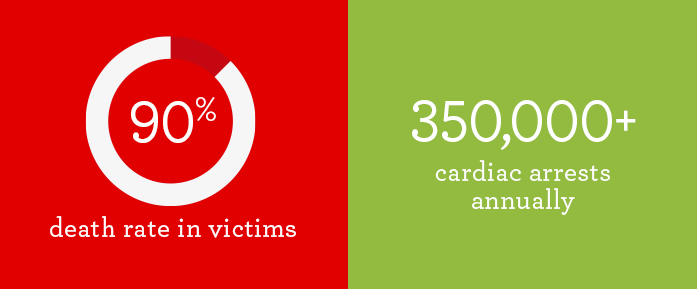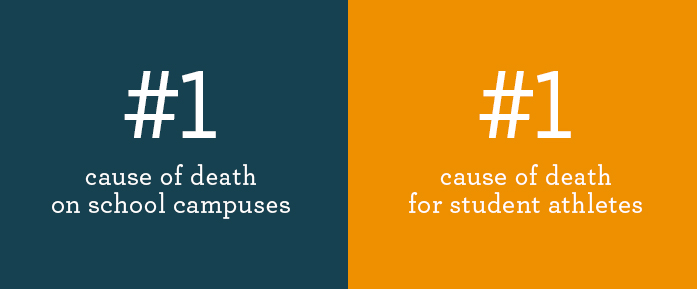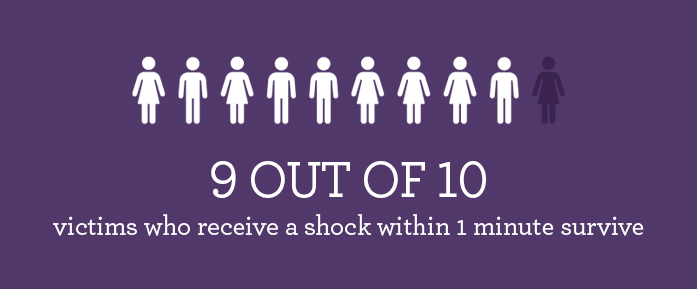Every 2 minutes, a heart stops suddenly.1
Sudden Cardiac Arrest (SCA) occurs when the heart stops without warning, making it unable to pump blood throughout the body and causing the person to collapse. Each year in America, more than 350,000 cardiac arrests occur outside of hospitals. 2
When SCA occurs, immediate cardiopulmonary resuscitation (CPR) and Automated External Defibrillator (AED) use is critical, as chances of survival diminish 10% with each passing minute. Approximately 90% of SCA victims do not survive. 2

Sudden cardiac arrest in youth
SCA is the #1 cause of death on school campuses and the #1 cause of death for student athletes. 3 SCA in youth is frequently caused by an underlying heart condition that has gone undetected. Many youth with heart conditions appear healthy and have no known family history of heart-related illness, passing regular checkups and sports physicals throughout childhood without any abnormalities detected. While further medical tests can help provide early detection of heart abnormalities, insurance companies generally do not cover their costs without the presence of symptoms or a family history of heart problems.
Typically, SCA symptoms are silent until it is too late and a child has collapsed, leaving only seconds for bystanders to respond with CPR and AED use before a life is taken.

Prevention
Screening of all youth is important, as SCA affects both athletes and non-athletes. While recommendations for screening of athletes have been advanced by the American Academy of Pediatrics, exclusively conducting pre-participation evaluations for athletes omits millions of school children who do not participate in sports but may still be at risk for SCA.4
The Living for Zachary Heart Screening Program combines an Electrocardiogram, limited 2-D Echocardiogram, blood pressure screening and SCA Risk Health Questionnaire for a unique screening program that can help detect heart abnormalities in youth that may lead to SCA. All screenings are reviewed and interpreted by a board-certified cardiologist. A non-invasive, quick and cost-effective option for families in North Texas, this program was created with the purpose of helping to save young lives from SCA before it occurs.
Learn More: Heart Screening Program
WARNING SIGNS AND SYMPTOMS OF SCA3:
- Fainting or seizure during or after physical activity
- Fainting or seizure resulting from emotional excitement, distress or startle
- Chest pain or discomfort/ racing heartbeat
- Unexplained fainting or seizures
- Family history of heart disease
- Unusual shortness of breath
- Unusual fatigue/tiredness
- Dizziness/lightheadedness during or after physical activity
- Family history of unexpected sudden death during physical activity or during a seizure, or any other unexplained sudden death of an otherwise healthy family member under age 50
Call 911 immediately if any of these signs and/or symptoms appears life threatening. Otherwise, consult a physician promptly if you or someone you know has one or more of these signs and/or symptoms.
When SCA occurs, immediate CPR and AED use saves lives. In fact, 9 out of 10 SCA victims who receive a shock from an AED within 1 minute survive.2 Living for Zachary donates AEDs to youth-based organizations across Texas to give hearts of all ages a second chance in the moments where every second counts.
Learn More: AED Donation Program1 Heart Rhythm Society
2 American Heart Association
3 Parent Heart Watch
4 American Academy of Pediatrics 2012

